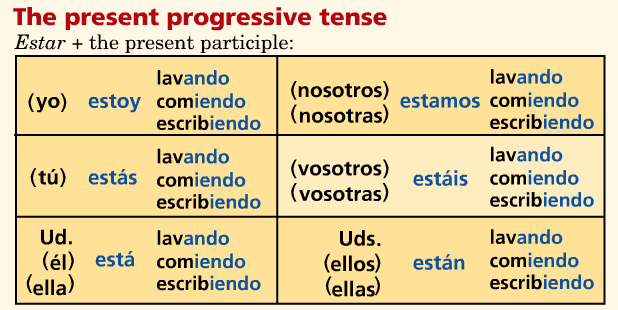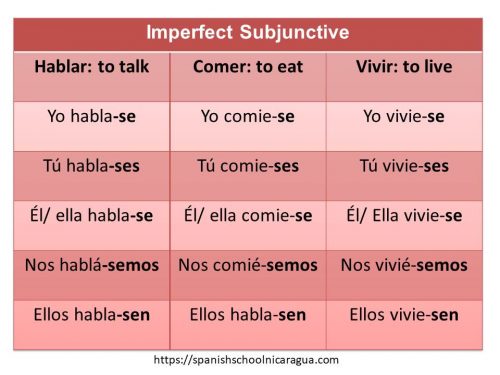

Jessie, ¡tú puedes! Vamos, _ otra repetición – Jessie, you can do it! Come on, do another rep.ĥ. Si tú hubieses _ caso no te hubiesen castigado – If you had listened, you would not have been punished.Ĥ. Yo _ mi propia ropa – I make my own clothesģ. Nosotros _ más ejercicio, pero nos lesionamos – We would do more exercise, but we got injured.Ģ. Now let’s go with a couple of exercises for you to train this new knowledge.ġ. Por favor, haz mi pizza sin jamón – Please make my pizza without ham Let’s get to practice!

¡No hagan un desastre en la mesa cuando coman! – Don’t make a mess at the table when you eat! (don’t do – don’t make/let’s not do – let’s not make) Let’s see! Imperative Mood’s Conjugations Subject And we won’t see so many verb tenses either, because orders can only be given in the present tense (think about it, even when talking about a future order, you enunciate it in the present tense). The nice part is that there aren’t as many people because the first person is not included, it’s impossible to give commands to yourself (unless you’re doing exercises and tell yourself you can with one more flex and still you refer to yourself as someone else). Maybe the word “imperative” sounds familiar, but just in case it doesn’t, this mood is all about commands and orders. Compound Tenses of the Subjunctive Mood Subject Si yo hiciera mis deberes, podría ir a la fiesta – If I did my homework, I could go to the party.

Ojalá la mamá de Jhonny haga una torta tresleches mañana – I hope Jhonny’s mom makes a tresleches cake tomorrow. Simple Tenses of the Subjunctive Mood Subject In this mood, you will need all your potential to memorize and do exercises speaking correctly, see this guide as many times as necessary until you feel confident in what you are doing (no pun intended!). Compound Tenses of the Indicative Mood SubjectĮvery time you need to express desires or hypotheses, you will need the subjunctive mood. – Ross and Rachel made peace after all this time. Ross y Rachel hicieron las paces después de todo este tiempo. Simple Tenses of the Indicative Mood Subject In the first table we are going to have the simple indicative tenses, and in the second one the compounds, which are constructed with the verb Haber. This mood shows the actions in a direct way, and of all the modes we are going to see, this is the simplest when constructing sentences. When you see a verb that doesn’t behave like a verb, you are seeing a verbal.įirst of all, remember that you will need a verb to accompany the verbals in order to use them, and secondly, their three forms are: infinitive, gerund, participle. The instant thought regarding conjugations is to assume that every time you see a word that is similar to the verb, it can be conjugated, and it doesn’t always happen. The fact that you are not running or moving your legs does not mean that it is not physical exercise, you have to train your tongue to pronounce correctly too! Verbals of the verb Hacer Just like riding a bicycle, the most reliable thing to do is to practice, first we read how the theory works and then we start with the practical exercises. To combat this irregularity, we will apply the old and reliable method of memorization, in order to have a conversation where you feel confident. We are going to see them every time we conjugate it, and that is where Hacer loses its regularity. What does it mean to be in the group of irregulars? Based on logic, irregular = changes.

And, to answer the question in the title, the best way to learn is… ¡Haciendo! Hacer: team irregular You’ve come to the right place if you’re researching what these conjugations are, how they change, and when to use them. Hacer (to do or to make) is one of the main verbs when you start learning Spanish and from it we can find derivative verbs that behave (conjugate) in a similar way, such as “rehacer” (re = repetition) and “deshacer” (des = reverse meaning). This is not necessarily a bad thing, everyone has an accent according to their country of origin, but one of the most noticeable characteristics when a non-native Spanish speaker speaks is: the way they conjugate verbs. Last week I was talking to a friend that I made in the USA thanks to an exchange program and you can still tell that he is not a native Spanish speaker.
#Hacer past tense pdf#
Download as a PDF ❼uál es la mejor forma de aprender?: Conjugation of the verb Hacer


 0 kommentar(er)
0 kommentar(er)
